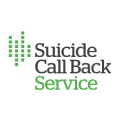Suicide
Sometimes life can be overwhelming, and suicide may seem like the only way to relieve the pain.
1 in 6 Australians will have thoughts of suicide at some point during their lives. Suicidal thoughts are common, but they can pass. You don't need to act on them.
On this page we'll help you find information and support if you're feeling suicidal, supporting someone else or have lost someone to suicide.
If you're in crisis right now, support is available.


Finding a way through suicidal feelings: 8 stories of hope
Suicide risk factors
The reasons that people take their own lives are often very complex. Risk factors (sometimes called vulnerability factors) can increase the likelihood of suicidal behaviour.
Known risk factors for suicide include:
previous suicide attempts
history of substance abuse
history of mental health conditions such as depression, anxiety, bipolar or post-traumatic stress disorder (PTSD)
relationship problems such as conflict with parents or intimate partners
legal or disciplinary problems
access to harmful means, such as medication or weapons
recent death or suicide of a family member or a close friend
ongoing exposure to bullying behaviour
physical illness or disability.







